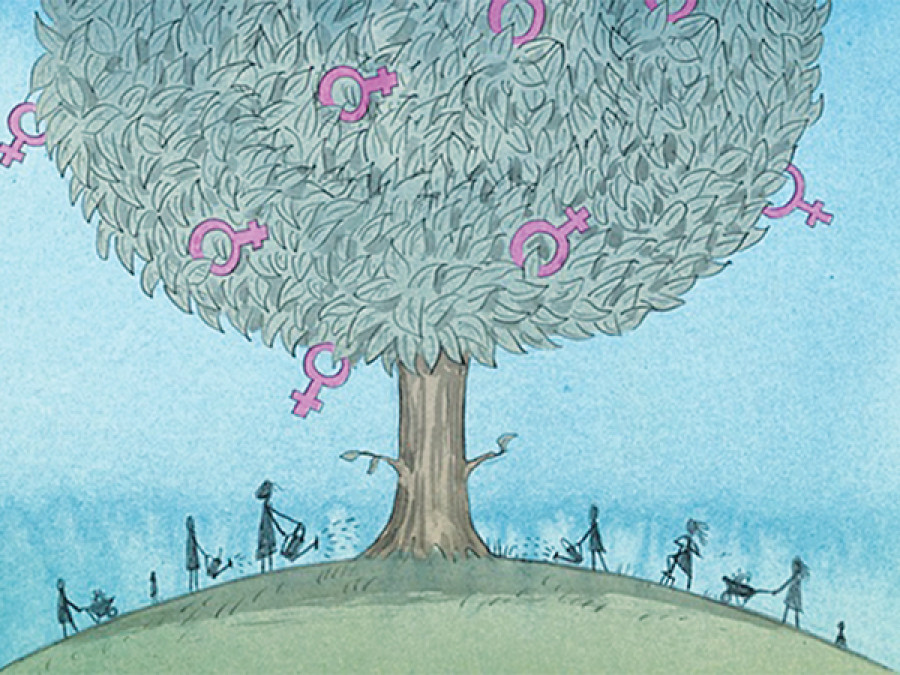Opinion
Still second sex
Despite the election of a female president, Nepal needs to do a lot more to empower its women
Mira Kafle
Nepal recently elected women’s rights campaigner Bidhya Devi Bhandari as its first female president. This is undoubtedly a milestone for women activists in a male-dominated society despite the fact that the presidency is a ceremonial post. Besides, the Parliament also elected Nepal’s female speaker, Onsari Gharti Magar sometime back. And if everything goes as expected, the country is likely to get its first female chief justice within the next few months. In addition, one-third of the seats in Parliament are reserved for women. Similarly, 33 percent of the seats in the bureacracy are also reserved for women. The rights of women are also assured by the constitution. These are the monumental achievements for everyone working to ensure gender equality and by doing so Nepal sets a commendable example for nations across the globe.
But despite these notable steps towards gender equality and women empowerment, women continue to face considerable challenges and obstacles particularly in rural and remote areas. Furthermore, Nepal is yet to formulate laws to ensure the implementation of its new statute.
Girls are still not treated as equal to boys whether in social, political, economical spheres or in the family. Most women work as unpaid care providers and agricultural workers. According to a Care International report, nearly 78 percent of economically active Nepali women are employed in the agricultural sector. More than three-quarters of these women are unpaid and are mostly employed by family members.
Restricted choice
During the Dashain, I travelled to Ramechhap with my little daughter. We stayed there for nine days. But I have to shamefully reveal that I did not even get time for myself to relax during the holidays because I was a daughter-in-law. I had no option but to do all household works while the men relaxed, doing nothing. And on asking other women in the village if their husbands helped them in housework, most of them complained that they did not receive any help from their spouses; they had resigned to their fate of being born as a woman. Even my sister-in-law works for almost 12 hours a day in the farm and six hours at home, but she does not get paid for any of her work.
Another woman in the village has given birth to 17 children because she still does not have the right to decide whether to use contraceptives or not. According to a
UN report, Progress of the World’s Women: Transforming economies, realising rights, 34 percent of the women in Nepal still do not get to independently decide on their health care and about 50 percent of women report difficulties in accessing health care services because the facilities are too far away.
And according to the 2011 census, the literacy rate of Nepali males and females is 75 percent and 57 percent respectively. The government needs to do more to increase the literacy rate of women and their access to education so that they have an equal shot at paid jobs.
The situation of women in other parts of the country is similar to my village in Ramechhap. Women continue to bear the triple burden of caring for the children, doing household work and engaging in agriculture. The women in my village and surrounding areas are unaware of the laws that guarantee women rights and the conventions that Nepal has ratified. So to empower women, we need to introduce incremental changes and gradually be bolder in our approach. We need to make sure that girls in each and every corner of the country can attend schools, get educated and get paid jobs and the respect they deserve. We must take every opportunity to ensure that rural women do not lag behind, but rather lead the way. Only a very few women have access to information and are thereby able to participate in political activities or secure a paid job in my village. Women’s groups, mother’s groups and women’s cooperatives are active in social, economic and cultural activities, but there is a glaring absense of women engagement in mainstream development activities.
It is essential to empower women to build a stronger economy, achieve internationally agreed goals for sustainable developments, and improve the quality of life of an individual, family and the community. The active involvement of women with full security and respect in the workplace, marketplace and community would greatly encourage them. What we need is for both men and women to work together in the kitchen, agricultural field, marketplace, offices and the Cabinet. The prevalent feudal mindet and patriarchal nature of Nepali society is yet to respect the voices of women. Therefore, the election of Bidhya Bhandari as President of Nepal is only just one among the many steps towards gender equality.
Kafle has a degree in social studies




 11.12°C Kathmandu
11.12°C Kathmandu










